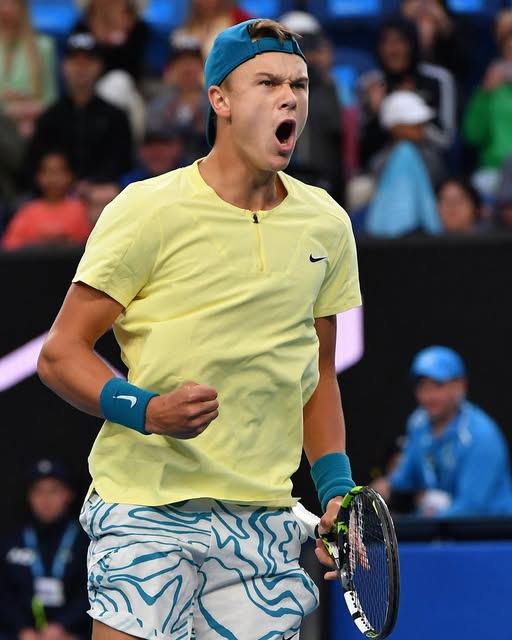Introduction: A Stir in the Tennis World

In a move that has sent ripples through the tennis community, former World No.1 Andy Roddick has expressed his shock at the recent strategic decision involving rising stars Casper Ruud, Lorenzo Musetti, and Holger Rune. These young ATP talents have opted to skip the 2024 Paris Olympics — a choice that has drawn widespread attention and raised eyebrows among fans, pundits, and former professionals alike.
In an era where Olympic participation is often seen as the pinnacle of sporting excellence, their decision has sparked questions:
Why would elite players pass on a once-in-four-years opportunity to represent their countries on the global stage?
Is this a trend or an isolated case?
And what does this mean for their careers and the future of tennis?
Let’s break down the full story, the players’ reasoning, Roddick’s passionate response, and what this controversial move reveals about the changing dynamics of professional tennis.
The Shocking Decision: Skipping the Paris Olympics 2024
Who Are the Players Involved?
- Casper Ruud – World No. 7 and a three-time Grand Slam finalist, known for his consistency and sportsmanship.
- Lorenzo Musetti – An Italian phenom with flair and finesse, recently breaking into the top 20.
- Holger Rune – A Danish firebrand, already seen as one of the most explosive talents in the next-gen ATP crop.
All three players have publicly confirmed they will not compete in the Paris 2024 Olympics, citing a variety of personal and professional reasons.
Why Is This So Shocking?
The Olympics are traditionally seen as the ultimate honor in sports — a stage where national pride and personal legacy intersect. While Olympic medals don’t offer ATP ranking points, they elevate an athlete’s profile and cement their legacy in sporting history.
Former tennis players like Andre Agassi, Andy Murray, and Rafael Nadal have often spoken about how Olympic gold meant as much, if not more, than a Grand Slam title. So, skipping such a prestigious event is a bold and controversial move, especially coming from players in their prime.
Andy Roddick’s Reaction: ‘Stunned, Honestly’
Former U.S. Open champion and ex-World No.1 Andy Roddick was visibly taken aback. Speaking on his podcast and to major media outlets, Roddick stated:
“I’m stunned, honestly. The Olympics are a unique chance — they don’t come every year like a Slam. For three players with bright futures to pass up on it? It’s concerning.”
Roddick highlighted three key reasons why this is a potential misstep:
- Missed Legacy Opportunity – “You only get 2-3 shots at the Olympics in a career.”
- Fan and National Disappointment – “Your country wants you on that court. This isn’t just personal.”
- Setting a Precedent – “Younger players might start thinking the Olympics don’t matter. That’s dangerous.”
Why Did They Opt Out?
1. ATP Tour Scheduling Conflicts
The Olympics fall during a congested part of the tennis calendar, right between Wimbledon and the North American hardcourt swing (which includes the US Open). For players chasing ATP points and Masters 1000 titles, taking a detour for a no-points Olympic event can be a risk to rankings and form.
Holger Rune’s camp confirmed: “We’re focused on building momentum toward the US Open. The calendar doesn’t give room for recovery post-Olympics.”
2. Surface Matters
The 2024 Paris Olympics will be held on clay courts at Roland Garros — an unusual surface for a summer event. For players who specialize in faster courts, this becomes a tactical disadvantage.
Casper Ruud, while a clay specialist, is reportedly managing long-term injury concerns, and his team believes the surface switch followed by a hardcourt season may strain his body.
3. Prioritizing Long-Term Goals
All three players are still chasing their first Grand Slam. The Olympics, although prestigious, may not directly contribute to their ATP career milestones. A single major title can redefine their legacy — and ranking-wise, it’s more impactful.
Frequently Asked Questions (FAQs)
1. Do ATP players earn ranking points at the Olympics?
No. Unlike other tournaments, the Olympics do not offer ATP ranking points, making it a more sentimental than strategic decision.
2. Can skipping the Olympics damage a player’s public image?
Potentially, yes. Especially in countries where Olympic participation is held in high esteem. However, fans often forgive if the player goes on to achieve major success in ATP events.
3. Have other top players skipped the Olympics before?
Yes. Notably, Roger Federer and Dominic Thiem have missed Olympics in the past due to injuries or schedule concerns. Still, it’s uncommon for multiple rising stars to skip in the same year.
4. How does this affect their national tennis federations?
National federations often rely on Olympic visibility to inspire the next generation. The absence of star players can be seen as a blow to national development programs.
The Bigger Picture: A Shift in Tennis Culture?
This situation reflects a broader trend in modern tennis: a growing preference for personalized career planning over traditional obligations. Today’s elite players work with tight-knit teams that meticulously manage training, rest, and tournament entries to maximize performance and longevity.
Moreover, with increasing emphasis on ATP Finals, Grand Slams, and Masters 1000 events, some players view the Olympics as a sentimental detour rather than a career-defining event.
Key Stat: According to a 2023 ATP survey, over 67% of players under age 25 rank Grand Slams above the Olympics in career priority.
What This Means for Tennis Fans
For die-hard tennis fans, this decision is understandably frustrating. Many were looking forward to seeing new talent challenge Olympic veterans like Novak Djokovic, Carlos Alcaraz, or Rafael Nadal, possibly for the last time on such a grand stage.
Without the participation of players like Ruud, Rune, and Musetti, the competitive depth of the Olympic draw may be reduced, altering the balance of power and fan engagement.
Still, it also opens doors for underdogs and lesser-known players to rise — perhaps even leading to a surprise Olympic champion, as we saw with Marc Rosset in 1992 or Alexander Zverev in 2021.
Strategies ATP Players Use When Making Career Decisions
Top professionals now use data analytics, injury history reviews, and mental health assessments to make tournament decisions. Here’s what factors into these career-altering choices:
- Ranking Implications – Will participation hurt their ATP point accumulation?
- Physical Toll – Can they handle travel, surface switches, and recovery?
- Sponsorship Obligations – Certain sponsors might push for Olympic visibility.
- Coach and Team Feedback – Agents, physiotherapists, and coaches weigh in.
- Mental Burnout Risks – Back-to-back events with high pressure can overwhelm.
The Business Impact of Skipping the Olympics
Let’s not forget the commercial implications. Brands like Nike, Adidas, and Wilson often design Olympic-specific merchandise. Players who skip may lose out on marketing exposure and exclusive endorsement deals tied to Olympic campaigns.
However, those who dominate the summer hardcourt season post-Olympics could reclaim that attention quickly — making it a high-risk, high-reward move.
Final Thoughts: Bold, Risky, or Necessary?
The decision by Ruud, Musetti, and Rune to withdraw from the 2024 Paris Olympics is undoubtedly controversial — but perhaps also a sign of tennis’s evolving priorities.
Where past generations viewed Olympic gold as a capstone achievement, today’s players may be leaning toward ATP-centric strategies, focusing on career longevity, physical sustainability, and ranking ascension.
Andy Roddick’s emotional reaction isn’t just nostalgia — it’s a call to reflect on what we value in sport. As fans, it’s essential to understand both sides: the allure of Olympic glory and the business-driven, tactical world modern players navigate.
Conclusion: A Defining Moment for a Generation
This moment may come to define a generational shift in tennis. With elite young players prioritizing the ATP Tour over national representation, the message is clear — the game is changing.
Will history view this as a smart move or a missed opportunity?
Only time — and titles — will tell.
Stay tuned as the Olympic tennis field evolves and new narratives emerge. One thing’s certain: the road to greatness is rarely straightforward, and the stars of tomorrow are making it on their own terms.


